英语小练习6A1-3
2022学年沪教版牛津英语小学四年级第二学期 M1各单元练习卷及M1模块练习卷(附解析)
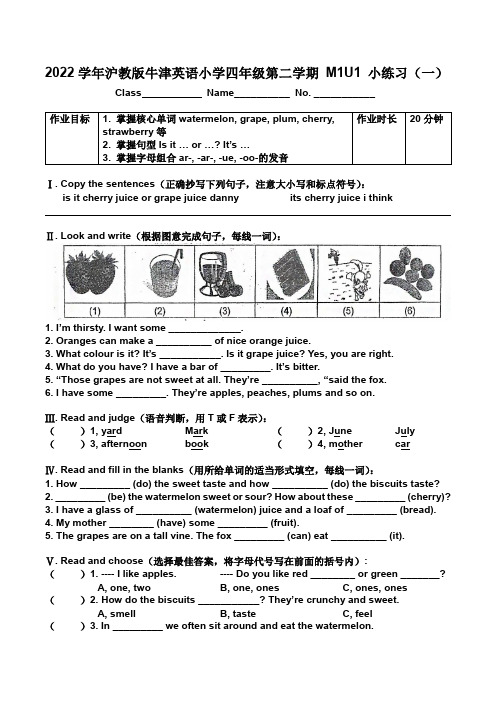
2022学年沪教版牛津英语小学四年级第二学期 M1U1 小练习(一)Class Name__________ No. ___________Ⅰ. Copy the sentences (正确抄写下列句子,注意大小写和标点符号):is it cherry juice or grape juice danny its cherry juice i thinkⅡ. Look and write (根据图意完成句子,每线一词):1. I’m thirsty. I want some _____________.2. Oranges can make a __________ of nice orange juice.3. What colour is it? It’s ___________. Is it grape juice? Yes, you are right.4. What do you have? I have a bar of _________. It’s bitter.5. “Those grapes are not sweet at all. They’re __________, “said the fox.6. I have some _________. They’re apples, peaches, plums and so on.Ⅲ. Read and judge (语音判断,用T 或F 表示):( )1, yard Mark ( )2, June July ( )3, afternoon book ( )4, mother carⅣ. Read and fill in the blanks (用所给单词的适当形式填空,每线一词):1. How _________ (do) the sweet taste and how __________ (do) the biscuits taste?2. _________ (be) the watermelon sweet or sour? How about these _________ (cherry)?3. I have a glass of __________ (watermelon) juice and a loaf of _________ (bread).4. My mother ________ (have) some _________ (fruit).5. The grapes are on a tall vine. The fox _________ (can) eat __________ (it).Ⅴ. Read and choose (选择最佳答案,将字母代号写在前面的括号内):()1. ---- I like apples. ---- Do you like red ________ or green _______? A, one, two B, one, ones C, ones, ones ( )2. How do the biscuits ___________? They’re crunchy and sweet. A, smell B, taste C, feel ( )3. In _________ we often sit around and eat the watermelon.A, spring B, summer C, autumn()4. Three glasses of orange juice ___________ for you.A, am B, is C, are()5. What’s inside? Please smell and __________.A, think B, guess C, see()6. What’s this fruit?Is it a plum __________ a cherry?A, and B, or C, /Ⅵ. Read and write(读一读,填上适当的单词,每线一词):1. Sometimes it’s green. Sometimes it’s red. Sometimes it’s sweet. Sometimes it’s sour and crunchy. Eat it everyday and keep the doctor away. What’s this fruit? It’s _________ (a/ an) __________.2. In summer we often enjoy it. It’s round and juicy. It’s green outside and red inside. We like eating the __________ and babies like drinking the juice.3. The grapes are purple and round. What __________ grapes!---- Who can eat the grapes, the fox or the bird?---- The bird. Because the bird _________ fly but the fox can’t.4. ---- Now _________ the plum with your nose. Is it nice?---- Sorry, I have a bad cold(感冒).Ⅶ. Rewrite the sentences(按要求改写下列句子,每线词数不限):1. The grapes are on a tall vine.(改为一般疑问句)_________________________________________________________________________ 2. Taste the grapes, please.(改为否定句)_________________________________________________________________________ 3. I have some small cherries.(根据划线部分提问)_________________________________________________________________________ 4. The big cake is sweet.(根据划线部分提问)_________________________________________________________________________ 5. Is this an apple? Is this a plum?(用or两句并一句)_________________________________________________________________________Ⅷ. Match(将合适的问句和答句配对)()1. Is the plum sweet? A. It’s sweet.()2. How does the fish taste? B. Yes, it does.()3. Is the watermelon sweet or sour? C. It’s salty.()4. Does the fox like the grapes? D. Grapes.()5. What does your mother like? E. Yes, it is.Ⅸ. Read and judge(阅读短文,判断正误,用T或F表示):There is a big old tree near my house. A black bird lives in the tree. Every morning I take some food to the tree. The bird sees me and comes down. The food is in my hand. The bird comes to my hand and eats the food. After that it goes back to the tree.I give some food to this bird every day. And so the bird knows(认识)me. I like thebird and the bird likes me, too. We are good friends.()1. The tree near my house is young.()2. I like the bird but it doesn’t like me.()3. Every day I give the bird some food.()4. The bird comes to my home and eats the food. ()5. Birds are good for the Earth(地球).参考答案:Ⅰ. Is it cherry juice or grape juice, Danny?It’s cherry juice, I think. Ⅱ. 1, strawberries2, glass3, purple4, chocolate 5, sour6, fruitⅢ. 1, T2, F3, F4, FⅣ. 1, does do2, Is cherries3, watermelon bread4, has fruit5, can’t themⅤ. 1. C 2. B 3. B 4. C 5. B 6. BⅥ. 1, an apple2, watermelons3, nice can 4, smellⅦ. 1, Are the grapes on a tall vine?2, Don’t taste the grapes, please.3, What do you have?4, How is the big cake?5, Is this an apple or a plum?Ⅷ. 1. E 2. C 3. A 4. B 5. DⅨ. 1. F 2. F 3. T 4. F 5. T2022学年度沪教版牛津英语小学四年级第二学期M1U1小练习(二)Class__________ Name___________ No.___________Ⅰ. Copy the sentences (正确抄写下列句子,注意大小写和标点符号):close your eyes danny smell it is it a peach or an apple_________________________________________________________________________Ⅱ. Look and write (写出合适的单词完成句子,每线一词,首字母已给):1. ---- What do you have, Eddie?---- I have some c___________.2. ---- Taste them. What are they?They’re s____________.3. ---- Where are the g____________?---- They are on a tall vine.4. In s___________ we often eat watermelons. They are sweet and juicy.5. Mark often r____________ his car with his sister.6. Look at the pineapple. It’s r___________ outside.Ⅲ. Read and write (读一读,用括号内所给单词的适当形式填空):1. Today is Sunday. My mother and I go to buy some __________ (fruit).2. Now taste these ___________ (peach). How __________ (do) they taste?3. ---- Are the red __________ (cherry) for ___________ (we)? ---- Yes, they are.4. Please __________ (listen) and __________ (guess). What is it?5. ---- I have some new pencils. I don’t like these blue __________ (one).6. Please ___________ (taste) your sweets. ___________ (be) they bitter?7. They are my ___________ (hand). I can __________ (play) cards.8. ---- What __________ (be) it?---- It’s _________ (a) apple.9. There are two ___________ (cherry). They are ___________ (Mary).Ⅳ. Read and choose (读一读,选一选):() 1. Give me _________ biscuits, please. I’m hungry.A, A bottle of B, a glass of C, a box of() 2. ---- How many __________ of shoes do you have?---- Three.A, pairs B, pair C, a pair() 3. I can see __________ apple juice in the glass.A, some B, a C, an() 4. Are they green plums ___________ purple plums?Purple plums.A, and B, but C, or() 5. There is __________ in the fruit baskets.A, a big red apple B, a red big apple C, a big and red apple () 6. ---- It’s small and red. It’s soft. It’s sweet and nice. What is it?---- _______.A, A strawberry B, A watermelon C, An apple() 7. ---- __________ your brother, Mark, like cherries?---- Yes.A, Is B, Does C, Do() 8. The big ones are nice. __________ the small ones?A, How B, What C, How aboutⅤ. Rewrite the sentences (根据要求改变下列句子,每线一词):1. I like rice. I like noodles. (改为选择疑问句)___________ you like rice ____________ noodles?2. Tom has a box of plums. (改为特殊疑问句)___________ ____________ Tom have?3. Smell the peaches, please. (改为否定句)___________ ____________ the peaches, please.4. My dress is long. My dress is short. (改为选择疑问句)___________ your dress long ___________ ___________?5. There is a strawberry on the plate. (改为复数句)There ___________ two ___________ on the ____________.6. It is salty. (根据划线提问)___________ does ___________ ___________?Ⅵ. Read and write (句意填空,首字母已给,每线一词):1. There is a bunch (串) of g__________ on the vine.2. T__________ the pear. It’s juicy and crunchy.3. I’m t___________. Give me some water, please.4. They’re red outside and inside. They’re smooth and sweet. They’re small. They’re t____________.5. Close your eyes. T___________ this. What is it?6. The monkeys like eating b___________ best.参考答案:Ⅰ. Close your eyes, Danny. Smell it. Is it a peach or an apple?Ⅱ. 1, cherries2, strawberries3, grapes4, summer5, rides 6, roughⅢ. 1, fruit2, peaches do3, cherries us4, listen guess5, ones6, taste Are7, hands play8, is an9, cherries Mary’sⅣ. 1, C2, A3, A4, C5, B 6, A7, B8, CⅤ. 1, Do or2, What does3, Don’t smell4, Is or short5, are strawberries plates6, How it tasteⅥ. 1, grapes2, Taste3, thirsty4, tomatoes5, Taste 6, bananas2022学年度沪教版牛津英语小学四年级第二学期M1U2小练习(三)Class_________ Name_________ No._________Ⅰ. Copy the sentences(正确抄写下列句子,注意大小写和标点符号):do you have a jacket eddie no i don’t_________________________________________________________________________Ⅱ. Look and write(写出合适的单词完成句子,每线一词,首字母已给):1. Please touch the table. How __________ it ____________?2. Look at the __________. They are not thin. They are ____________.3. ---- Are the pencils ___________?---- No, ___________ sharp.4. ---- Hello. Is it a hard pillow(枕头)?---- No, it’s a ___________ one.5. ---- ___________ kites are those?---- They are ___________.6. ---- Please ___________ the toy bear ____________ the bag. ---- OK.Ⅲ. Read and write(用所给单词的适当形式填空,每线一词):1. ---- Whose __________ (key) are they?---- They’re ___________ (Tom).2. Please ___________ (touch) the fruit. ____________ (be) it rough?3. Look, my shoes ___________ (be not) big. They ____________ (be) small.4. ---- How ____________ it ____________ (feel)? ---- It’s bitter.5. Are ___________ (this) your rulers?---- No, my __________ (ruler) are yellow.6. Jill, is this __________ (you) rabbit?---- Yes, it’s ___________ (I) rabbit.7. Let’s ___________ (go) to school together. ---- OK.Ⅳ. Rewrite the sentences(按要求改写下列句子,每线一词):1. There is some juice in the bottle.(改为一般疑问句)________ ________ _________ _________ _________ ________ ________?2. The knife feels sharp. The knife feels blunt.(改选择疑问句)________ the knife feel _________ _________ _________?3. This is an orange glass.(改为复数句)________ _________ orange _________.4. Please taste the sweet cakes.(改为否定句)Please _________ __________ the sweet __________.5. These are Eddie’s new pencil cases.(根据划线部分提问)________ ________ _________ _________ __________ __________?6. Touch your book. How does it feel?(根据实际情况回答)It’s ___________.7. The books are thick.(改为否定句,但意思不变)The ___________ ___________ __________.Ⅴ. Read and write(句意填空,首字母已给,每线一词):1. They’re purple and round. They are small, but they’re sweet. They’re g________.2. Whose k________ are they? They are sharp. They’re Danny’s.3. I can’t write. Because my pencil is b__________. I need a knife.4. Look at the books. They are t___________. They are not thin.5. Please p________ the apples on the plate. ---- OK.6. Dad and Mum, let’s walk on the sand. It’s very s___________.Ⅵ. Read and write(阅读短文,填入适当的单词,每线一词,首字母已给):Hello, I am Eddie. I am a student. I like reading and w__________. This is my bedroom. It’s small, but it’s tidy. In it, you can s__________ a desk. It’s big and yellow. There are many books on it. Some are t__________. Some are thin. Some are blue. Some are white. Near the books, there i__________ a pencil case. It’s not short. It’s long. It’s s__________ and hard. I like sitting at the desk.参考答案:Ⅰ. Do you have a jacket, Eddie?No, I don’t.Ⅱ. 1, does feel2, books thick3, blunt they’re 4, soft5, Whose Alice’s6, put inⅢ. 1, keys Tom’s2, touch Is3, aren’t are 4, does feel5, these rulers6, your my 7, goⅣ. 1, Is there any juice in the bottle?2, Does sharp or blunt3, These are glasses4, don’t taste cakes5, Whose new pencil cases are these?6, smooth7, books aren’t thinⅤ. 1, grapes2, knives3, blunt 4, thick 5, put6, softⅥ. writing see thick is smooth2022学年度沪教版小学牛津英语四年级第二学期M1U2小练习(四)whose pencil cases are these theyre miss fangs_________________________________________________________________________Ⅱ. Think and write(根据要求写单词)A. 反义词sharp ---- ___________soft ---- ___________smooth ---- __________ thin ---- __________/ __________cool ---- __________B. 同音词hear ---- __________right ---- ____________Ⅲ. Read and choose(选出发音不同单词的编号):() 1. A, girl B, purse C, her D, teacher () 2. A, Laura B, for C, doctor D, floor () 3. A, hard B, yard C, breakfast D, last() 4. A, school B, full C, ruler D, too() 5. A, case B, books C, nice D, those () 6. A, thick B. this C, three D, monthⅣ. Read and fill in the blanks(用所给单词的适当形式填空,每线一词)1. Whose ____________ (strawberry) are these?___________ (it’s) Alice’s.2. Here ___________ (come) a man on ____________ (a) big elephant.3. Let’s ___________ (play) on the beach. Can I ___________ (drink) some juice?4. Peter, ___________ (touch) the pineapples. How __________ (do) they feel?5. Some fruit __________ (be) sour. I don’t like ___________ (eat) it.Ⅴ. Read and choose(选择最佳答案,将字母代号写在前面的括号内):() 1. Apple juice is a kind of(一种)____________.A, drink B, drinking C, drinks() 2. --- ‘What’s that?’ ___________ one of the brothers.--- ‘It’s an elephant.’ ___________ the man.A, ask, answer B, answers, asks C, asks, answers () 3. Four brothers are ___________ blind.A, both B, all C, another() 4. Miss Fang likes reading books. Look, this book is ___________ thick.A, too B, to C, so() 5. We cannot take the knife because it’s too __________.A, sharp B, rough C, thin() 6. There is __________ in the sand. It’s hard.A, some thing B, something C, some things () 7. I can’t find my ball. Oh, it’s ___________ the door.A, beside B, in front of C, behindⅥ. Read and write(读一读,填上适当的单词,每线一词):1. Four brothers are all blind. They cannot ___________, but they can __________.2. This book is so __________. I like it very much.3. I can’t find the key to the ___________. So I can’t come into my home.4. Touch that tree. Its trunk is __________ because the tree is very old.Ⅶ. Rewrite the sentences(按要求改写下列句子,每线词数不限):1. Kitty, put your ball in the bag.(改写否定句)______________________________________________________________________2. Whose sharp knife is that?(复数句)3. The pineapple is hard and rough.(根据划线部分提问)4. These are Kitty’s red cherries.(根据划线部分提问)5. We like the beautiful pencil case very much.(用Jill替换we,其余作相应变化)Ⅷ. Reading comprehension(阅读理解)It’s the first day of school. Tom wants to go back to school. He wants to see his friends. He wants to meet his new teacher.Tom gets up early in the morning. He washes and eats his breakfast. Then he rides his bike to school. He sees his friends in the playground. He plays hide-and seek with them. In the classroom, Tom meets his new English teacher. Her name is Mrs Green. Tom likes Mrs Green. She can speak English very well. He thinks she is a nice teacher. () 1. Does Tom wash and eat breakfast in the morning?A, Yes, he is.B, Yes, he does. C, No, he doesn’t.() 2. Mrs Green is ___________.A, Tom’s mother B, Tom’s Chinese teacher C, Tom’s English teacher () 3. Tom plays _________ with his friends.A, football B, basketball C, hide-and-seek() 4. Where does Tom meet his new teacher?A, In the playground B, In the classroom C, Under the tree.() 5. Tom gets up early because____________.A, he wants to go back to schoolB, he wants to see his friends and new teacherC, Both A and B参考答案:Ⅰ. Whose pencil cases are these?They’re Miss Fang’s.Ⅱ. A. blunt hard roughthick/ fat warmB. here writeⅢ. 1, D2, C3, C4, B5, D6, B Ⅳ. 1, strawberries They’re2, comes a3, play drink4, touch do5, is eatingⅤ. 1. C2, C3, B4, C5, A6, B 7, CⅥ. 1, see hear2, thin/ thick3, door4, thick Ⅶ. 1, Kitty, don’t put your ball in the bag.2, Whose sharp knives are those?3, How does the pineapple feel? /How is the pineapple?4, Whose red cherries are these?5, Jill likes the beautiful pencil case very much.Ⅷ. 1, B2, C3, C4, B5, C2022学年度沪教版小学牛津英语四年级第二学期M1U3小练习(五)Class___________ Name___________ No.___________Ⅰ. Copy the sentences(正确抄写下列句子,注意大小写和标点符号):in the morning the sun rises behind the sun the trees shadow is longplease dont bite me henry is afraid_________________________________________________________________________Ⅱ. Look and write(根据图意完成句子,每线一词):1. Look at the bananas. They are b___________ the oranges.2. ---- How many d___________? ---- There are two.3. This is my s____________. She’s also my friend.4. Henry likes his new friend. He likes p__________ with it.5. ---- Whose c____________ are these?---- They’re Alice’s.6. Beside the bench, there is a p___________.Ⅲ. Read and choose(判断下列划线部分单词的发音,把发音不同的单词写在括号内):1. Miss Sheep is reading and eating bread.()2. Mr Bear can hear Miss Deer crying in fear.()3. Whose soft sofa is this?()4. In autumn, we can sit on the warm lawn. It’s not hard.()5. It is too hot at noon in June and July.()Ⅳ. Read and choose(选择最佳答案,将字母代号写在前面的括号内):() 1. The moon ___________ in the morning.A, goes up B, goes down C, rises() 2. It is at noon. My shadow grows ___________.A, short B, long C, tall() 3. My shadow often ____________ with me.A, go B, going C, goes() 4. The dog wants to bite Jill. Jill is ____________.A, happy B, afraid C, lovely() 5. I go to school at seven o’clock. My shadow is ___________.When I go home in the evening, my shadow grows ___________ again.A, short, short B, long, short C, long, long () 6. Henry __________ a sound.A, smells B, touches C, hears() 7. Alice likes ___________ with shadows. Let’s ___________ with her.A, playing, play B, playing, plays C, play, playing () 8. ---- ___________ shadow is this?---- It’s my father’s.A, Who’s B, Who C, Whose() 9. Some fruit __________ hard. Some drinks __________ cold.A, are, are B, is, is C, is, are() 10. We can ___________ the shadow, but we can’t ___________ it.A, touch, hear B, see, smell C, taste, touchⅤ. Read and write(读一读,用括号内所给单词的适当形式填空):1. It’s a beautiful __________ (sun) day. We __________ (walk) around the road.2. My shadow often __________ (go) with me. Sometimes it __________ (stay) beside me.3. Henry likes __________ (run) and __________ (play) with the ball.4. This dog __________ (swim) very fast.5. My shadow is ___________ (like) me. I stop. It ___________ (stop), too.Ⅵ. Rewrite the sentences(按要求改写下列句子,每线词数不限):1. The shadow grows long in the evening.(改为一般疑问句)________________________________________________________________________ 2. Stick the pencil, please.(改为否定句)________________________________________________________________________ 3. The hill’s shadow is on the path in the evening.(根据划线部分提问)________________________________________________________________________4. The black shape is Henry’s shadow.(根据划线部分提问)5. I like eating cakes. I like eating biscuits.(改为选择疑问句)Ⅶ. Read and write(读一读,填上适当的单词,每线一词):1. Henry _________ like the black shadow. He is afraid.2. In the evening, the child’s shadow is _________.3. The sun is high in the sky at _________.4. My shadow is ___________ the wall.5. I can ___________ with my nose and touch with my ___________.Ⅷ. Read and answer(阅读短文,回答问题):Look at the picture. The sun is behind the hill. It is red. There are many green treeson the hill. But now they are golden under the sun. The hill’s shadow is black and long. In front of the hill, there is a blue lake. We can see some boats on it. Beside the river, there is a small house. A white rabbit is outside the house on the lawn. It is eating the grass. Some ducks are between the lake and the house. An old man is sitting inside the house. What a nice picture it is!1. What is in front of the hill? ________________________________________________2. Whose house is it? ______________________________________________________3. Where is the rabbit eating? ________________________________________________4. Is the hill’s shadow short? ________________________________________________5. Is it in the morning or at noon? _____________________________________________参考答案:Ⅰ. In the morning, the sun rises behind the sun. The tree’s shadow is long. Ⅱ. 1, behind2, deer3, shadow4, playing5, cherries 6, pathⅢ. 1, bread2, Bear3, Whose4, hard5, July Ⅳ.1, B, 2, A3, C4, B5, C 6, C7, A8, C9, C10, BⅤ. 1, sunny walk2, goes stays3, running playing4, swims5, like stopsⅥ. 1. Does the shadow grow long in the evening?2. Don’t stick the pencil, please.3. Where is the hill’s shadow in the evening?4. Whose shadow is the black shape?5. Do you like eating cakes or biscuits?Ⅶ. 1, doesn’t2, long3, noon4, on5, smell hands Ⅷ. 1. In front of the hill, there is a blue lake.2. It is an old man’s.3. It is eating outside the house on the lawn.4. No, it isn’t.5. It is in the morning.2022学年度沪教版小学牛津英语四年级第二学期M1U3小练习(六)Class__________ Name___________ No.___________Ⅰ. Copy the sentences(正确抄写下列句子,注意大小写和标点符号):in the morning is the trees shadow long yesⅡ. Look and write(根据图意,写出相应的单词,每线一词):1. Look, the __________ is in front of the tree. It’s not long. It’s short.2. ---- Are they ___________? ---- No. They are mountains. They are high.3. ---- Where is the bird?---- It’s on the ___________.4. ---- What’s on the __________?---- There is a fox.5. Look at the sun. It __________ behind the hill in the morning.6. You look tired. Please sit ____________.Ⅲ. Read and write(用所给单词的适当形式填空,每线一词):1. Please ___________ (look) at the moon. It ___________ (rise) in the evening.2. ---- Can you ___________ (see) the sun in the evening? ---- No, I __________ (can not).3. ---- What colour __________ (be) the hill?---- It ___________ (be) green.4. ---- How many __________ (bench) can you see?---- I can see one __________ (bench).5. ---- Whose __________ (friend) are these?---- They’re __________ (Linda).6. Look, the __________ (tree) shadow is on the lawn. It ___________ (grow) short.Ⅳ. Choose the best answer(选择最佳答案,将字母代号写在前面的括号内):() 1. Look ___________ the sea ____________ summer.A, at … on B, to … in C, at … in() 2. In the evening, the sun ___________ down.A, go B, is go C, goes() 3. Look, the hippo ____________ eating grass.A, like B, is like C, likes() 4. In the morning, the tree’s shadow is ____________.A, long B, high C, short() 5. There are some small trees ____________ the lawn.A, on B, beside C, under() 6. My shadow ___________ short and small ____________ noon.A, grows… at B, grows… in C, plays… at Ⅴ. Rewrite the sentences(按要求改写下列句子,每线一词):1. These are Mrs Wang’s shadows.(根据划线提问)____________ _____________ are ____________?2. This is a shadow. It’s the cat’s.(合并成一句,但意思不变)____________ is the ____________ ____________.3. Is that a long bench?(改为复数句)____________ _____________ long ____________?4. The paths are very long.(改为否定句)The ____________ _____________ very _____________.5. Is it a bench? Is it a chair?(改为选择疑问句)____________ ___________ a bench _____________ a chair?6. Ann goes to school at seven in the morning.(一般疑问句)____________ Ann ____________ ____________ ___________ at seven in the morning?Ⅵ. Read and write(句意填空,首字母已给,每线一词):1. The sun g__________ down in the evening. It’s behind the hill.2. Where is Jack? He’s sleeping in the b____________.3. In the evening, the tree’s s____________ is long.4. The sun is very h___________ in the sky at noon.5. The black shape runs a___________ the dog.6. After dinner, we can walk on the p___________.7. In the morning, the sun r__________ behind the hill.参考答案:Ⅰ. In the morning, is the tree’s shadow long? Yes.Ⅱ. 1, shadow2, hills3, bench4, lawn5, rises 6, downⅢ. 1, look rises2, see can’t 3, is is4, benches bench 5, friends Linda’s6, tree’s growsⅣ. 1. C 2. C 3. C4, A5, A6. AⅤ. 1. Whose shadows these 2. This/ It cat’s shadow3. Are those benches4. paths aren’t long5. Is it or6. Does go to school Ⅵ. 1, goes 2, bed3, shadow4, high5, after 6, path7, rises2022学年度沪教版小学牛津英语四年级下册M1单元复习练习(七)Class__________ Name__________ No.___________Ⅰ. Copy the words, phrase and sentences(正确抄写句子,注意大小写和标点符号):touch this how does it feel eddie its hardⅡ. Look and write(根据图意,写出合适的单词完成句子,每线一词,首字母已给):1. Touch the pineapple. It is r_________ and hard.2. ---- Taste the lemon. Is it s_________?---- Yes, it is.3. ---- Whose pencil is this? It’s so s_________. ---- Paul’s.4. Some f_______ is sweet.5. In the morning, the tree’s shadow is on the l__________.6. ---- Are the s____________ red?---- Yes, they are.Ⅲ. Read and judge(判断下列各组单词划线部分的发音,用“T”或“F”表示):Ⅳ. Read and write(读一读,用括号内所给单词的适当形式填空):1. This is _________ (Alice) father. He like ________ (swim) in the sea.2. There ________ (be) some fruit and some drinks on the table.3. Here ________ (come) a man on an elephant.4. ---- Whose ________ (key) are these?---- They are _________ (Danny).5. Let’s _________ (go) to the shop. I want ________ (buy) a new bag.Ⅴ. Read and choose(读一读,选一选,将字母代号写在前面的括号内,将字母代号写在前面的括号内):() 1. ---- How does the cherry taste?---- It is _________.A, hard B, rough C, sweet() 2. These books are not thin. They are ________.A, fat B, thick C, new() 3. When the lights go off. We won’t see the shadow ________ more.A, any B, many C, some() 4. The purple plum is sweet. ________ the green one?A, How B, What C, How about() 5. We can look and see _________ our eyes.A, use B, with C, on() 6. How _________ these lemons feel?A, are B, do C, does() 7. Mark _________ a little car. He __________ it in his yard.A, has, rides B, have, is riding C, has, ride() 8. It is a beautiful ________ day.A, sun B, sunny C, cloudⅠ. Touch this. How does it feel, Eddie? It’s hard.Ⅱ. 1, rough2, sour3, sharp 4, fruit5, lawn6, strawberriesⅢ. 1, F2, T3, T4, T5, FⅣ. 1, Alice’s swimming2, is3, comes4, keys Danny’s 5, go to buyⅤ. 1, C2, B3, A4, C5, B 6, B7, A8, B。
六年级上册英语一课一练-Module 6 Unit 1 I have got some Chines

Module 6 Unit 1 I have got some Chinese chopsticks同步练习一、单词。
1.筷子2.困难的3.城市4.回答5.结束6.头发7.风筝8.鸟9.孩子们10.问题11.小刀12.叉子二、短语。
1.4点半2.一些纽约的照片3.中餐4.玩……5.一本关于美国的书6.一副刀叉三、单项选择。
1.I met Daming here ______ New York. A from B at C in D on2.Chinese chopsticks are difficult ____ me . A to B for C with D like3.Have you got a book _____ America ? A at B in C about D for4.I have got some photos ____ New York. A about B with C of5.Our school starts _____ eight o’clock. A in B to C on D at四、连词成句。
1.time is what the (?)2.and American schools time what start do finish (?)3.big a i s city New York (.)4.kite brother got a Chinese my has (.)5.answer will questions I your Amer ica about (.)五、翻译下列句子。
1.你有什么?我有一副刀叉。
2.你有一些桔汁吗?是的,我有。
3.我没有一本关于美国的书。
4.几点了?九点半。
5.谢谢你给我的来信。
参考答案:一、1.chopsticks 2.difficult 3.city 4.answer5.finish6.hair7.kite8.bird9.children 10.question 11.knife 12.fork二、1.half past four 2.some photos of New work 3.Chinese food4.play5.a book about the US6.a knife and fork三、C B C C D四、1.What is the time?2.What time do American school start and finish?3.New York is a big city.4.My brother has got a Chinese kite.5.I will answe r your question about America.五、1.What have you got? I have got a knife and fork.2.Have you got so me orange juice? Yes, I have.3.I haven’t got a book about the US.4.What’s the time? It’s half past nine.5.Thank you for your letter.。
七年级英语上册(人教新目标Goforit!)Unit6第1课时(SectionA1a2d)说课稿

3.评价与反馈:组织学生进行自评、互评,培养他们的评价能力和反思意识,同时给予教师反馈,以便调整教学策略。
四、教学过程设计
(一)导入新课
为了快速吸引学生的注意力和兴趣,我将采用以下方式导入新课:
1.利用实物展示:带来一些水果和饮料,如香蕉、苹果、橙子、牛奶、果汁等,让学生直观地看到并猜测它们在英语中的名称。
(二)学习障碍
学生在学习本节课之前,已经掌握了一些基本的英语词汇和语法,能够进行简单的日常交流。但在本节课中,学生可能面临以下学习障碍:
1.对一般疑问句的构成和回答掌握不够熟练;
2.对新词汇的发音和拼写存在困难;
3.在实际情境中,可能难以迅速运用所学知识进行表达。
(三)学习动机
为了激发学生的学习兴趣和动机,我将采取以下策略或活动:
2.加强对学生的个别辅导,关注他们的个性化需求;
3.不断丰富自己的教学资源,提高课堂的趣味性和互动性。
1.创设生活化的教学情境,让学生在实际语境中学习英语,提高他们的学习兴趣;
2.设计丰富多样的课堂活动,如小组竞赛、角色扮演等,增强学生的参与度和互动性;
3.针对不同学生的学习需求,给予个性化的鼓励和指导,提高他们的自信心;
4.结合学生的兴趣爱好,引入相关话题,使他们能够更好地将英语学习与实际生活相结合。通过这些策略和活动,激发学生的学习兴趣,提高他们的学习动机。
1.小组活动:让学生分成小组,设计自己的食谱,并用所学句型和词汇进行介绍。
2.课堂游戏:开展“猜猜我喜欢的食物”等游戏,让学生在轻松愉快的氛围中巩固新知。
3.口语练习:组织学生进行两人对话,模拟在餐厅点餐的场景,提高学生的口语表达能力。
幼小衔接英语每日一练
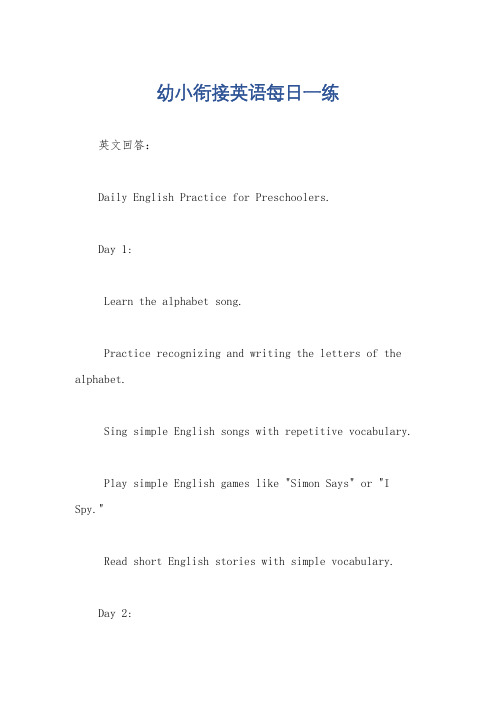
幼小衔接英语每日一练英文回答:Daily English Practice for Preschoolers.Day 1:Learn the alphabet song.Practice recognizing and writing the letters of the alphabet.Sing simple English songs with repetitive vocabulary.Play simple English games like "Simon Says" or "I Spy."Read short English stories with simple vocabulary.Day 2:Practice counting to 10 in English.Introduce basic colors and shapes.Play counting games or sing counting songs.Build towers or structures with blocks and count them in English.Color simple shapes and practice naming them in English.Day 3:Introduce basic animal vocabulary.Practice animal sounds and movements.Play animal-themed games or songs.Read books about animals and discuss theircharacteristics.Create animal masks or puppets for role-playing.Day 4:Introduce basic family vocabulary.Practice identifying family members and their names. Play family-themed games or songs.Read stories about families and discuss family roles. Create a family tree or draw family portraits.Day 5:Introduce basic food vocabulary.Practice naming and describing fruits, vegetables, and other foods.Play food-themed games or songs.Have a taste-testing session with different foods and encourage children to describe them in English.Create a food collage or cookbook with pictures and descriptions.Day 6:Introduce basic clothing vocabulary.Practice naming and describing different clothing items.Play dress-up games or songs.Have a fashion show where children model different clothes and describe them in English.Create a clothing catalog with pictures anddescriptions.Day 7:Introduce basic weather vocabulary.Practice describing different weather conditions.Play weather-themed games or songs.Create weather charts or maps.Conduct simple weather experiments and discuss the results.中文回答:幼小衔接英语每日一练。
英语特殊疑问句练习
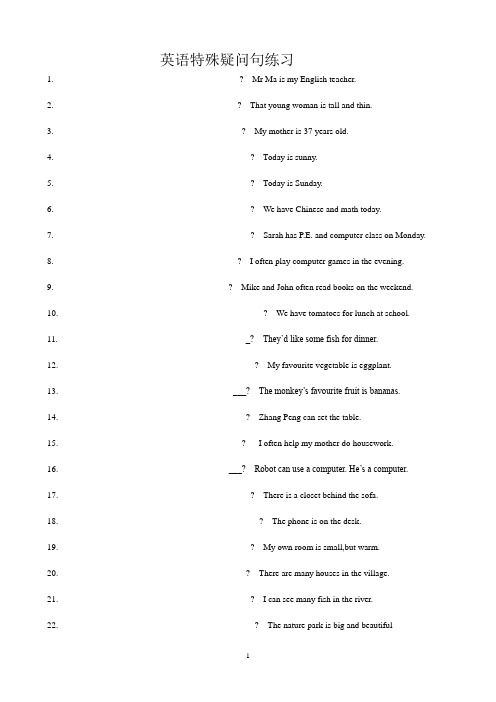
英语特殊疑问句练习1. __________________________________________? Mr Ma is my English teacher.2.__________________________________________? That young woman is tall and thin.3.___________________________________________? My mother is 37 years old.4._____________________________________________? Today is sunny.5._____________________________________________? Today is Sunday.6._____________________________________________? We have Chinese and math today.7._____________________________________________? Sarah has P.E. and computer class on Monday.8.__________________________________________? I often play computer games in the evening.9.________________________________________? Mike and John often read books on the weekend.10._______________________________________________? We have tomatoes for lunch at school.11.____________________________________________? They’d like some fish for dinner.12._____________________________________________? My favourite vegetable is eggplant.13.___________________________________________? The monkey’s favourite fruit is bananas.14.___________________________________________? Zhang Peng can set the table.15.__________________________________________? I often help my mother do housework.16.__________________________________________? Robot can use a computer. He’s a computer.17.____________________________________________? There is a closet behind the sofa.18.______________________________________________? The phone is on the desk.19.____________________________________________? My own room is small,but warm.20.___________________________________________? There are many houses in the village.21.____________________________________________? I can see many fish in the river.22._____________________________________________? The nature park is big and beautiful特殊疑问句what where who how many which why1.What can you do ?(扫地)_________________________________2.What can your sister do?(洗衣服)_________________________________3.What can the robot do ?(使用电脑)__________________________________4.What do you do on Sunday?(踢足球)_____________________________________5.What do you have for lunch on Tuesday?(土豆和牛肉)___________________________6.__________________________________________? Sarah can sweep the floor.7._________________________________________? My father can do the dishes.8._________________________________________? I can make the bed.9.________________________________________.? Mr Yang is my Chinese teacher.10._______________________________________? I often play football on Saturdays.11.___________________________________? I have music, art, P.E. and English on Wednesdays正确的特殊疑问词填空。
人教版八年级英语上册U6 Section A (Grammar Focus—3c)基础练习(含答案)
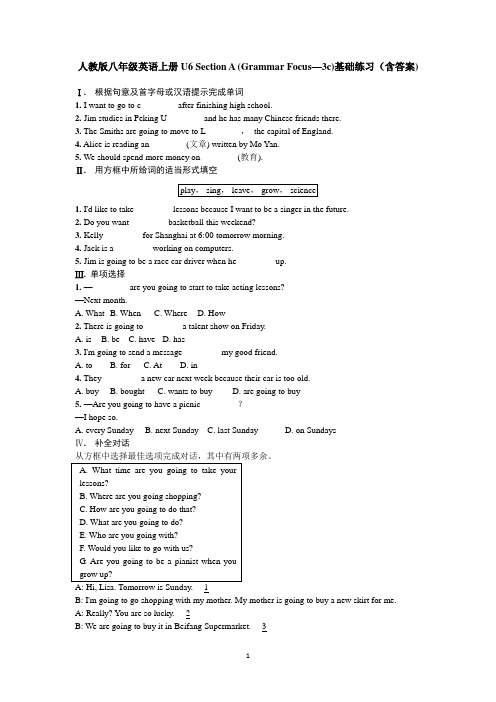
人教版八年级英语上册U6 Section A (Grammar Focus—3c)基础练习(含答案)Ⅰ. 根据句意及首字母或汉语提示完成单词1. I want to go to c________ after finishing high school.2. Jim studies in Peking U________ and he has many Chinese friends there.3. The Smiths are going to move to L________,the capital of England.4. Alice is reading an ________(文章) written by Mo Yan.5. We should spend more money on ________(教育).Ⅱ. 用方框中所给词的适当形式填空play, sing, leave, grow, science1. I'd like to take ________ lessons because I want to be a singer in the future.2. Do you want ________ basketball this weekend?3. Kelly ________ for Shanghai at 6:00 tomorrow morning.4. Jack is a ________ working on computers.5. Jim is going to be a race car driver when he ________ up.Ⅲ. 单项选择1.—________ are you going to start to take acting lessons?—Next month.A. WhatB. WhenC. WhereD. How2. There is going to ________ a talent show on Friday.A. isB. beC. haveD. has3. I'm going to send a message ________ my good friend.A. toB. forC. AtD. in4. They ________ a new car next week because their car is too old.A. buyB. boughtC. wants to buyD. are going to buy5.—Are you going to have a picnic ________?—I hope so.A. every SundayB. next SundayC. last SundayD. on SundaysⅣ. 补全对话从方框中选择最佳选项完成对话,其中有两项多余。
新外研版八年级英语下册导学案Module 6-Hobbies (Unit1-Unit3)

外研版八年级英语下册导学案Module 6 HobbiesUnit 1 Do you collect anything?学校________ 班级________ 姓名________一、学习目标:1、知识目标:①通过自主学习,掌握本单元的词汇及短语。
2、能力目标:①能辨别多种爱好。
②能咨询他人爱好,介绍自己的爱好。
并发表看法。
3、情感目标:培养对他人不同爱好的尊重,维持良好的人际关系。
二、重点及难点1、重点:词汇和短语。
2、难点:能够熟练交流自己及其他人的爱好。
三、学习步骤【课前自学】1、看Module1Unit1的词汇表,学会拼读单词并牢记。
2、阅读课本P2,理解activity3的对话内容,并画出重点短语和难句。
【课文导学】一.Greeting.:Talk about the winter vacation:How was your winter vacations?What did you do during the vacation?Are you interested in …?What did your father/ mother often do ?Did he / she do it all the time?So his / her hobby is to ….二、翻译下列单词和短语1. stamp_____2.collect_______3 least_______4.interview______5.成功_________6.收拾________7.占用_________8.对······感兴趣_________9.在···的末尾________10.照看_________11.a bit_____12 all the time_____三、听力训练完成听力练习1,听材料一完成a12,听材料二,完成a4 ,再听一遍,将文中不明白的地方标出四、重点句型:1.Which hobby do you think takes up the least space? ( Unit 1, P2)takes up 表示“占据时间或空间”。
综合英语3课后练习
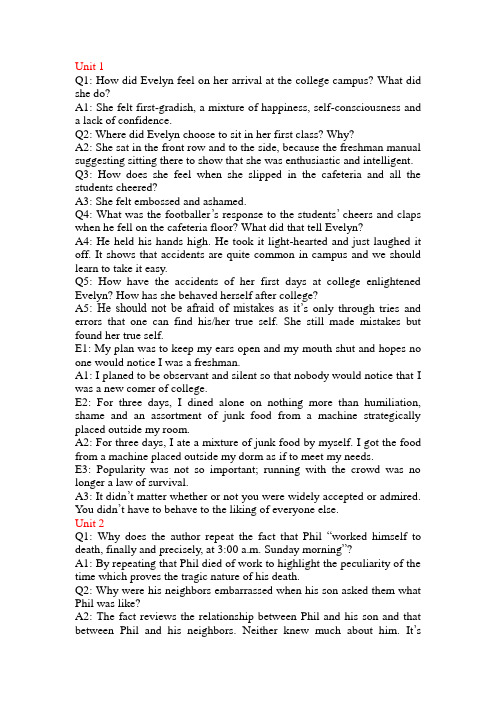
Unit 1Q1: How did Evelyn feel on her arrival at the college campus? What did she do?A1: She felt first-gradish, a mixture of happiness, self-consciousness and a lack of confidence.Q2: Where did Evelyn choose to sit in her first class? Why?A2: She sat in the front row and to the side, because the freshman manual suggesting sitting there to show that she was enthusiastic and intelligent. Q3: How does she feel when she slipped in the cafeteria and all the students cheered?A3: She felt embossed and ashamed.Q4: What was the footballer’s response to the students’ cheers and claps when he fell on the cafeteria floor? What did that tell Evelyn?A4: He held his hands high. He took it light-hearted and just laughed it off. It shows that accidents are quite common in campus and we should learn to take it easy.Q5: How have the accidents of her first days at college enlightened Evelyn? How has she behaved herself after college?A5: He should not be afraid of mistakes as it’s only through tries and errors that one can find his/her true self. She still made mistakes but found her true self.E1: My plan was to keep my ears open and my mouth shut and hopes no one would notice I was a freshman.A1: I planed to be observant and silent so that nobody would notice that I was a new comer of college.E2: For three days, I dined alone on nothing more than humiliation, shame and an assortment of junk food from a machine strategically placed outside my room.A2: For three days, I ate a mixture of junk food by myself. I got the food from a machine placed outside my dorm as if to meet my needs.E3: Popularity was not so important; running with the crowd was no longer a law of survival.A3: It didn’t matter whether or not you were widely accepted or admired. You didn’t have to behave to the liking of everyone else.Unit 2Q1: Why does the author repeat the fact that Phil “worked himself to death, finally and precisely, at 3:00 a.m. Sunday morning”?A1: By repeating that Phil died of work to highlight the peculiarity of the time which proves the tragic nature of his death.Q2: Why were his neighbors embarrassed when his son asked them what Phil was like?A2: The fact reviews the relationship between Phil and his son and that between Phil and his neighbors. Neither knew much about him. It’sperhaps that he has so dedicated to his work that he could spare no time for the people around him.Q3: What do you think is the relationship like between Phil and his family?A3: His wife has given up of herself and had missed him for all those years. His eldest son has asked neighbors about him. His daughter had nothing to say with him. And his youngest son said he only boarded at home.Q4: What is the implication of the ending?A4: The implication is that another tragedy is on the way. There’s a culture in the company that drives people to work themselves to death.Q5: Do you think it’s a sheer waste of life to die so young for working so hard? What can you learn from the death of Phil?A5: Dying so young and working so hard is not worth doing. We should keep the balance between work and entertainment.E1: He had no outside “extracurricular interests,” unless of course, you think about a monthly golf game that way.A1: He had dedicated all his time to work and had no hobby at all except that he played a golf game once a month, which can’t be taken as a hobby anyway.E2: She had, according to her daughter, given up trying to compete with his work years ago, when the children were small.A2: Their daughter said that when they were still small, his father had become a company man and her mother had given up every attempt to keep him at home.Q1: How do people in the small town take the author’s habit of walking around for his business?A1: They find it odd to see the author walking for his business and they feel guilty for leaving the author on the sidewalk without driving him to the place he is going to.Q2: Why do the people consider his preference for walking at times a bit eccentric?A2: Ordinary Americans, even in this agreeable and easy place, on foot have virtually never done so. In the US, people have got accustomed to using cars for everything,Q3: To what extent have the American people come to depend on cars?A3: The American people have depended on cars for almost everything to such a extent that they’ve forgotten about what they can do with their legs. Sometimes, they would take great and ridiculous trouble with driving rather than take an easy walk.Q4: What’s the problem with urban planning of American cities? What does that have to do with the dependence of the American people on cars?A4: The US government has spent less than one per cent of the transportation budge on facilities for pedestrians.Q5: What do you think makes the author sad at the end of the passage?A5: He’s sad because he has come to realize from the case of Laconia that people don’t walk anywhere anymore in the country.E1: In the United States we have become so habituated to using the cars for everything that it doesn’t occur to us to unfurl our legs and see what those lower limbs can do.A1: People in the USA tend to drive to everywhere so much so that they have forgotten that they still have legs and about what their legs can do. E2: I confess it had not occurred to me how thoughtlessly deficient nature is in this regard.A2: I admitted that I have never realized how poorly equipped our bodies are in this aspect.E3: …but afterward I realized that I was possibly the only person ever to have entertained the notion of negotiating that intersection on foot.A3: …maybe I was the only one who had ever attempted to cross the intersection on foot.Unit 4Q1: What’s the popular concept of fun, according to Jordan?A1: Most people believe that fun is and should be reality available whenever they wanted. If there is not fun, they would make fun. If something is not fun, they would make it fun. In a word, they deserve fun, which is within their reach.Q2: How does advertising help to cultivate our fun-seeking appetite?A2: Ads or TV commercials help to develop the modern fun fetish by setting examples and showing how much fun we should have got from consuming all the items being advertised.Q3: How old was Jordan when she had an especially good time with her friend Pam? Describe in your own words why she had such a wonderful time that day.A3: 12. Jordan had a fun night to look forward to. She had lots of candies and her friend had imitating a sailor’s posture of words. All these were simple forms of fun appealing to a girl. More importantly, she was a simple innocent girl without insatiable appetite for fun. That’s why she could feel fun of simple joy.Q4: What is fun according to Jordan?A4: Fun is in simple pleasures in life, which lies in work and fulfillment of one’s duty.Q5: Do you agree with Jordan’s view about the modern fun fetish? Why or why not?A5: Fun is everywhere. We can find fun in simple joy of life, so there’s no need to step up the level of danger.Unit 5Q1: What does Professor Bella DePaul’s study indicate about lying? What do most people think about lying?A1: Lying is a common phenomenon and most of lies are small and insignificant. Meanwhile, it is common that people take lies lightly, because their lies have caused little preoccupation or regret.Q2: Why do people tell lies or white lies?A2: According to passage, the purpose of telling lies or white lies varies. Women tell a lie according to the principle of caring or spare other’s feelings. Men tell lies basically for utilitarian self-promotion purpose.Q3: What does the example of tom tell? And what does Josephson’s reply to tom suggest?A3: The story of tom supports the argument that little white lies are ubiquitous and people have taken these lies for granted, believing that they are well-intended. Josephson’s reply is very negative. His mother-in-law may feel hurt when she discovers the deceit someday or even worse. In short, such white lies may produce distrust among people. Q4: What, according to the author, are the consequences of lying?A4: The consequences of lying are three fold, the deceived may feel cheated and won’t trust the liar any more; the liar will lose trust and get intangled in the lies he weaves. And if lies proliferate endlessly, society as a whole would falter and collapse as trust is damaged or destroyed.Q5: Are all white lies unacceptable? What is the yardstick of acceptable lies?A5: Not all white lies are unacceptable. Some white lies like setting somebody up for a surprise party or telling children about tooth fairy can be justified. However, you have to consider the attitude of the deceived towards lying. I.e. whether your act will undermine his trust in you.E1: What a tangled web we weave, when first we learn to deceive.A1: When we start to tell a lie, we have entered a very intricate situation as a lie often requires other lies until the whole structure of the lies become so complex, it tracks the liar.E2: “Psychological barriers wear down; the ability to make more distinctions can coarsen; the liar’s perception of his chances of being caught may warp.”A2: One is less inhibited in lying, his ability to make moral judgement is dulled and he may become less cautious against being caught.E3: The most understandable and forgivable lies are an exchange of what ethicists refer to as the principle of trust for the principle of caring.A3: The most understandable and acceptable are those which are told for the sake of love and care at the expense of trust according to the ethicists. Unit6Q1: What is the problem with poetry, according to the author? And whatdoes he suggest as the solution?A1: The problem in the poetry is that people find it difficult to write a poem, so they don’t even try. What is worse is that they have virtually given up reading poems. The author believes that people can be encouraged to write a poem easily, even if it’s really rotten.Q2: Why does he suggest writing a rotten poem, instead of a decent poem?A2: The idea is to make it easy for everyone to write at least one poem in his life.Q3: Why does he suggest using unusual nouns and conflicting human senses?A3: That’s a rule of thumb and the fashion of today. Unusual nouns and conflicting senses can create profound images and feelings and poetic atmosphere.Q4: How does writing a rotten poem help promote poetry reading?A4: When you have written a poem, it will be an accomplishment, so you feel free to read the works of your fellow poets. You may find some inspiration from their poems and therefore continue writing your poems. In this way, you keep observing the emotion of yourself and others.E1: Good poets and poems are lost forever simply because there is no market for them, no people who write their own verse and seek out further inspiration from other bards.A1: good poets have stopped writing poems, because there’re fewer and fewer readers and fellow poets. They can’t depend on poetry writing for a living and there’s no poetic society, from which they can draw inspiration and stimulation.E2: Observe others’emotions and experience your own---that’s what poetry is all about.A2:The point of poetry is to express and recall emotions, so when you read poems, you will observe the emotions of the poet. When you write your own poem, you need to observe and organize your emotions.Unit 7Q1: What’s the implied meaning of the old man’s remark, “young people who need a love potion very seldom have five thousand dollars. Otherwise they would not need a love potion”A1: What the old man means is that a young man who is in love one-sidedly is seldom rich enough to win a gir l’s heart. His words imply that money is an important factor for love. If a man is not rich, he can rarely expect to be loved by a girl.Q2: What are the effects of the love potion?A2: It has powerful, everlasting effects. To begin with, it may produce sexual desire in the person who takes in. on the spiritual side, it can replace indifference with devotion, and scorn, with adoration. It willmake a gay girl want nothing but solitude and her lover’s company. She will feel jealous of him. She will want be to everything of him. Even if he slips a little, she will forgive him though terribly hurt. In a word, she’ll fall in love with him if she drinks the love potion.Q3: Why is the love potion priced at one dollar while the glove-cleaner is so expensive?A3: It’s an iron by which the author seems to imply that love is far from being pressures or desirable. It’s easy for a man to fall in love, yet it’s hard for him to stick to it. Should he regret someday, he would pay a much high price to get him out of this. Anyway, for the old, and for his customers, the life-cleaner is more important than the love potion.Q4: What does the old man’s remark in paragraph 39 “one has to be old enough to indulge in that sort of thing” mean?A4: This means there’s a wide difference between the young and the old. Young people tend to be over passionate for love. Sometimes, senselessly and irrationally, while the old, just like the old man, who sells the mixtures would take a cool and sensible, sometimes even cynical attitude towards life.Q5: What does the end of the story indicate?A5: An urban and polished reply to the young man’s goodbye meaning “until I see you again” indicates the old man’s firm belief that the young man will eventually come back to him for the life-cleaner. This shows his cynical passion about love.E1: It is only when one is in a position to oblige that one can afford to be so confidential.A1: just because I’m able to do you a favour, I feel safe to tell you so much about my other medicine.E2: “For indifference,” said the man, “they substitute devotion. For scorn, adoration.Unit 8Q1: What is meant by a sense of proportion?A1: A sense of proportion could be a seen as the ability to take into full consideration all important factors in an issue and attach due weight to each factor.Q2: What does the writer try to illustrate by the examples of research in medicine and study of the atom?A2: In the first place, they’re examples of the idea raised at the very beginning of the text. The problem is partly due to the fact that it’s now more difficult to acquire of a sense of proportion. In consequence, break throughs in science are likely to bring about harms if human kind fails to see the end of science, and consider everything in a comprehensive manner.Q3: Why is wisdom a necessary quality in people and culture?A3: According to the author, the vices of the lack of wisdom are obvious ranging from disturbance to public life to unpleasant incidents in private life. Meanwhile, they seem to be an imbalance in the growth of knowledge and wisdom, which is very likely to make things even worse. So wisdom is very necessary for both personal and cultural developments.Q4: What, according to Russell, is the essence of wisdom? And how does that explain the process to attain wisdom?A4: it’s impartiality or emancipation from egoistic concerns. It’s very hard for man to attain impartiality, as man is naturally bound up by his own physical states ever since his birth. As he grow up, however, his horizon widens, his concerns get beyond limits of time and space, and his feelings become more impersonal. Thus he grows in impartiality and wisdom.Q5: Could you explain the importance of impartiality for you?A5: According to the fact that impartiality is one of the ingredients in respect. It’s also the basis of rationality, for irrationality is normally based on partiality.E1: Even an end which it would be noble to pursue if it were attainable may be pursued unwisely if it is inherently impossible of achievement.A1: It would be unwise to pursue a goal that’s bound to fail, though it might be noble to do something.E2: I think the essence of wisdom is emancipation, as far as possible, from the tyranny of the here and now.A2: I think the essence of wisdom is to get one’s horizon free from limit of time and space.Unit 9Q1: How important is food and eating, according to Kenneth Lo?A1: They determine people’s physical health and their spiritual and moral soundness and his ultimate well-being.Q2: How do the Chinese and westerners differ in their attitudes towards food?A2: According to the author, many people in the west are gourmets and gluttons, while a large number of others are pretty indifferent to food. On the contrary, to Chinese people, food is of primary importance and is one of the ecstasies of life. Also, when they go to a restaurant, westerners care more about the table than the food, while the Chinese aim to eat with the capital E or to take the food with enjoyment.Q3: Why does the author say that Chinese food is the only truly international food?A3: Literally, Chinese food is ubiquitous. Chinese restaurants are sprung up and area almost everywhere. At the root of the phenomenon is a strong interest in Chinese food in the west. There’s an increase in sensuality inthe western world and coincidently Chinese food is very sensual in its combination of color, texture and taste.Q4: Why does the author compare a proper Chinese meal to a religious ceremony?A4: For Chinese people, the traditional high quality Chinese meal is a serious matter. It’s fastidiously prepared and fastidiously enjoyed. Both the preparation and enjoyment of a Chinese meal can last hours and make a shared experience. The meal must not only meet the challenge of the palate but also satisfy the eye.Q5: How does Chinese food express the basic assumption of life?A5: A good traditional Chinese meal must be well-prepared and balanced in order to meet the demand of the palate and the eye alike. There’s moral excellence in good cooking, which indicates the combination of all life, all action and all knowledge. It’s not simply the product of recipe. It expresses the basic assumption of life, harmony and balance.E1: Food to my countrymen is a kind of the ecstasies of life, to be thought about in advance; to be smothered with loving care throughout its preparation; and to have time lavished on it in the final pleasure of eating. A1:To Chinese, food is one of the greatest joys in life. It’s thought about carefully in advance and prepared with love and care. When it’s ready, we devote a lot of time to enjoy it.E2: It’s this increased sensuality and the desire for great freedom from age-bound habits in the west, combined with the inherent sensual concept of Chinese food, always quick to satisfy the taste buds, that is at the root of the sudden and phenomenal spread of Chinese food throughout the length and breadth of western world.A2: The main reason for the sudden and amazing spread of Chinese food throughout the world lies in two facts. One is the increased desire for sensual pleasure and freedom from age-old customs in the west. The other is the notion of physical pleasure provided by Chinese food, which is always ready to satisfy the taste of the eater.Unit 10Q1: How does an avocation writer differ from a professional writer in light of some principles of writing?A1: The two speakers, a vocational writer and an amateur differ significantly in some aspects of writing principles. Concerning whether writing is hard or easy, an avocational writer takes writing easily as a means of pleasure and stops when he is unhappy or comes across any difficulty. However, a professional writer takes writing as an act of literature, which shall go on anyhow and could be hard and lonely sometimes.Q2: How did the author take the differences?A2: The author was interested and amused by the differences. Hebelieved that the differences had given the audience a broader concept of writing.Q3: What’s the right way of writing, according to the author, if there is any?A3: The author believes that as there are all kinds of writers and all kinds of methods, any method that helps people to say what they want to say is the right method for them. The most important thing is that the writer must express himself and get himself felt in any piece of writing.Q4: What does the author mean when he says “ultimately the product that any writer has to sell is not the subject being written about, but who he ot she is”?A4: The author means that what a writer actually puts on paper is not as important as the enthusiasm or warmth he puts in his writing. In the same way, a reader is more interested in the enthusiasm or emotional baggage that that the writer may bring to his writing. So writing is very personal work.Q5: What does the title mean?A5: The personal transaction means personal expression or the communication between the writer and the reader. He means to personalize writing.E1: They sit down to commit an act of literature, and the self who emerges on paper is a far stifle person that the one who sat down.A1: Writers are likely to take writing earnestly and anxiously and are, therefore, not able to express themselves naturally.E2: It’s not necessary to want to spend a year alone at Walden Pond to become deeply involved with a writer who did.Unit 11Q1: what’s the genuine process of learning, according to the author?A1: According to the author, the genuine process rests with students with their own investigation which is the best thing a teacher can guide a student to. She believes that learning is not so much the acquisition of knowledge as it’s an investigation.Q2: Is discipline important for studies?A2: According to the author, there’s no shootout of learning. Persistence and discipline are by students to reach the very-end and savor the flavor of hard-won success.Q3: What’s the importance of risk taking?A3: It’s a problem with the current educational approach that students are discouraged from venturing far enough to take risks to make mistakes. However, if people try different approaches and do things that have no precedence, they will surely make mistakes, which, as the author argues, are the stepping stones of creative people.Q4: How do you understand the state that “to learn, then, is to openoneself”?A4: It means one has to drop his prior knowledge so as to absorb new knowledge. If he refuses to do so, the old knowledge may hinder the assimilation of new knowledge. It also implies that one should learn to appreciate constructive criticism. If he constantly fails to take criticism, he can never know where his weakness lies and grow out of it.Q5: What do you think the author means by saying “listen with your whole body”?A5: “listen with your whole body” is to get yourself fully activated both cognitively and physically. You have to be extremely attentive to what the teacher says instead of letting your mind wonder and keeping your body inert.E1: Children enter school as question marks and leave as periods.A1: When they start school. Children are curious and ready to try everything unknown. However, they end up losing the pioneering spirit after years of formal education.E2: Being “advanced”has its own pitfalls---among them complacency and pushing or forcing.A2: Advanced learners are likely to make some mistakes, such as excessively satisfied with their progress, or on the contrary, putting too much pressure on themselves to score further achievements.Unit12Q1: Why does Snyder keep the gun pointed at the nine men?A1: He knows very well that without the gun, the nine men on the lifeboat would jump at the remaining water like animals or they would even kill him for the water.Q2: Why didn’t he allow the nine men to drink the remaining water?A2: Once the water was gone, they would have nothing to look forward to but death. If he had given in to their instinct for the water, they would have emptied the last canteen days ago, and by then they would have all been dead.Q3: What’s the significance of the gun, as the author repeatedly mentions it?A3: Throughout the story, the narrator keeps referring to the gun and the fact that he was the only man with a gun. The gun means authority and responsibility, especially for the reason which he had to keep where the rest had lost it. When he handed over the fun to the boatswain’s mate, he was handling the duty, and it was amazing that the mate changed from a craving animal to a reasoning guard once he took the gun.Q4: Why did Snyder hate the bos’n’s mate? Or did he really mean it?A4: Snyder hated the bos’n’s mate because he has been the biggest threat to the water and he was able to sleep but Snyder could n’t. Snyder had to keep awake. Yet Snyder didn’t mean it when talking about the hatred.They weren’t personal enemies. Their confrontation arose as a result of the desperate situation and Snyder’s responsibility. He was the man with the gun and he was in command. He was the man who had to think. That’s the difference.Q5: Why did the bos’n’s mate change from an animal to a reasonable watcher?A5: Snyder was amazed to find out after he woke up that bos’n’s mate held the gun steadily at the rest and said that he had kept the apes for all day. He understood that when one was the boatswain in command and responsible for the rest, one would surely get to see things differently.E1: As a man I didn’t count any more, I was no longer third officer of the wrecked Montala. I was just a gun that kept them away from the water they craved.E2: But Barrett was beyond all reasoning. His mind had already cracked with thirst.。
九年级英语unit6课堂练习题
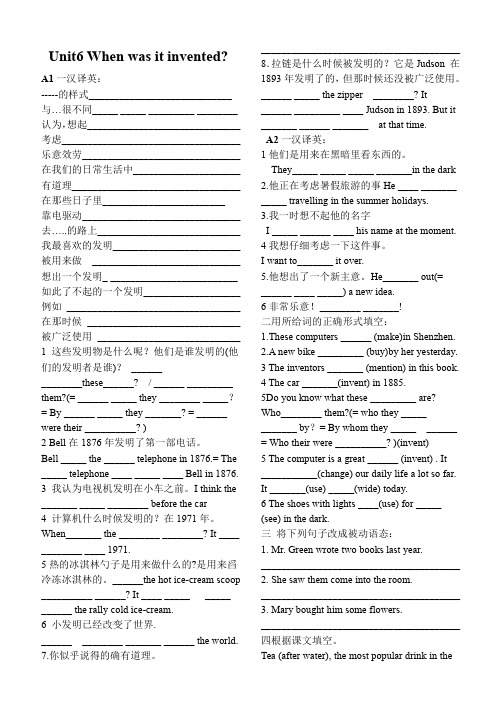
Unit6When was it invented? A1一汉译英:-----的样式____________________________与…很不同___________________________认为,想起______________________________考虑___________________________________乐意效劳_______________________________在我们的日常生活中_____________________有道理_________________________________在那些日子里________________________靠电驱动_______________________________去…..的路上____________________________我最喜欢的发明_________________________被用来做_____________________________想出一个发明__________________________如此了不起的一个发明___________________例如__________________________________在那时候______________________________被广泛使用____________________________ 1这些发明物是什么呢?他们是谁发明的(他们的发明者是谁)?______________these______?/_______________ them?(=___________they_____________?=By___________they_______?=______ were their__________?)2Bell在1876年发明了第一部电话。
Bell_____the______telephone in1876.=The _____telephone_____________Bell in1876. 3我认为电视机发明在小车之前。
(完整word版)三上英语课课练习(沪牛津版)M3U3
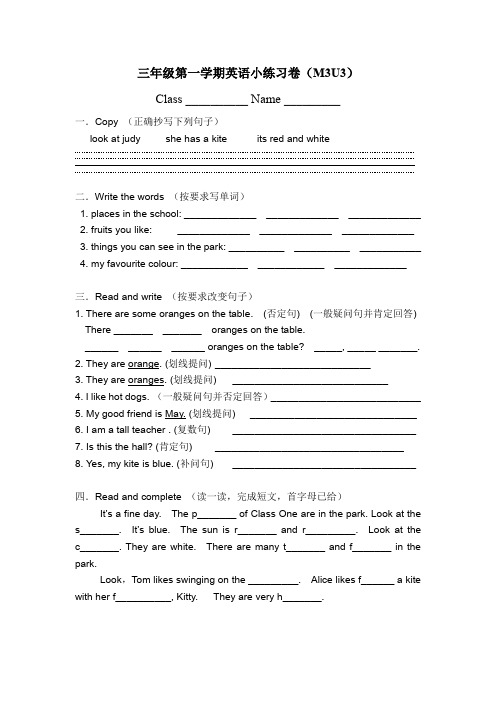
三年级第一学期英语小练习卷(M3U3)Class __________ Name _________一.Copy (正确抄写下列句子)look at judy she has a kite its red and white二.Write the words (按要求写单词)1. places in the school: _____________ _____________ _____________2. fruits you like: _____________ _____________ _____________3. things you can see in the park: __________ __________ ___________4. my favourite colour: ____________ ____________ _____________三.Read and write (按要求改变句子)1. There are some oranges on the table. (否定句) (一般疑问句并肯定回答) There _______ _______ oranges on the table.______ ______ ______ oranges on the table? _____, _____ _______.2. They are orange. (划线提问) ____________________________3. They are oranges. (划线提问) ____________________________4. I like hot dogs. (一般疑问句并否定回答)___________________________5. My good friend is May. (划线提问) ______________________________6. I am a tall teacher . (复数句) _________________________________7. Is this the hall? (肯定句) __________________________________8. Yes, my kite is blue. (补问句) _________________________________四.Read and complete (读一读,完成短文,首字母已给)It’s a fine day. The p_______ of Class One are in the park. Look at the s_______. It’s blue. The sun is r_______ and r_________. Look at the c_______. They are white. There are many t_______ and f_______ in the park.Look,Tom likes swinging on the _________. Alice likes f______ a kite with her f__________, Kitty. They are very h_______.。
七年级英语上册学案 Unit 6 Do you like bananas
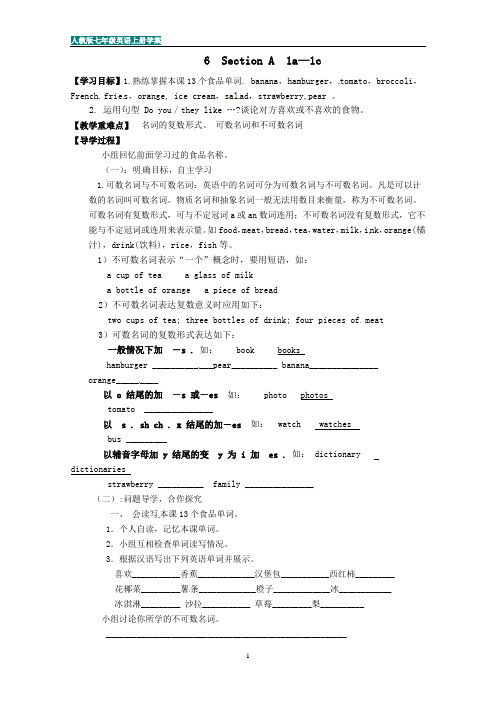
6 Section A 1a—1c【学习目标】1.熟练掌握本课13个食品单词. banana,hamburger,tomato,broccoli,French fries,orange, ice cream,salad,strawberry,pear 。
2. 运用句型 Do you/they like …?谈论对方喜欢或不喜欢的食物。
【教学重难点】名词的复数形式、可数名词和不可数名词【导学过程】小组回忆前面学习过的食品名称。
(一):明确目标,自主学习1.可数名词与不可数名词:英语中的名词可分为可数名词与不可数名词。
凡是可以计数的名词叫可数名词。
物质名词和抽象名词一般无法用数目来衡量,称为不可数名词。
可数名词有复数形式,可与不定冠词a或an数词连用;不可数名词没有复数形式,它不能与不定冠词或连用来表示量。
如food,meat,bread,tea,water,milk,i nk,orange(橘汁),drink(饮料),rice,fish等。
1)不可数名词表示“一个”概念时,要用短语,如:a cup of tea a glass of milka bottle of orange a piece of bread2)不可数名词表达复数意义时应用如下:two cups of tea; three bottles of drink; four pieces of meat 3)可数名词的复数形式表达如下:一般情况下加-s .如: book bookshamburger _____________pear__________ banana_______________ orange_________以 o 结尾的加-s 或-es 如: photo photostomato _______________以s . sh ch . x 结尾的加-es 如: watch watchesbus _________以辅音字母加 y 结尾的变y 为 i 加es .如: dictionary dictionariesstrawberry __________ family _______________(二):问题导学,合作探究一、会读写本课13个食品单词。
2024科教版六年级上学期英语期末复习针对练习

2024科教版六年级上学期英语期末复习针对练习班级:_____________ 姓名:_____________【单词拼写】1. 按要求完成下列各题。
[1]do(第三人称单数形式) ___________[2]like(现在分词形式) ___________[3]story(复数形式)_____________[4]go(第三人称单数形式) _________[5]write(第三人称单数) _____________[6]is (复数形式)__________________[7]have(第三人称单数) _____________[8]study(第三人称单数)___________[9]hobby(复数形式) _____________[10]bus(复数形式)___________2. 按要求完成下列各题。
1.dance(现在分词形式) _________________2.live(第三人称单数形式) _________________3.story(复数形式) _________________4.go(第三人称单数形式) _________________5.read(现在分词形式)_________________6.hobby(复数形式)_________________7.do(第三人称单数形式)_________________8.work(第三人称单数形式)_________________9.teach(第三人称单数形式) _________________10.is(复数形式)_________________3. 填写单词所缺字母。
(1) s ng (2) sw m(3) pl n (4) c n ma(5) p stman (6) tr ffic l ght4. 根据首字母填空。
[1]The man can m_________magic clothes for the king.[2]The boy is very c _________.His Maths is very good.[3]It r_________just now. I was all wet.[4]It was r_________yesterday. We had to stay at home.[5]There w_________a lot of people in Tian’anmen Square this morning.5. 单词拼写。
英语-6.have-got-has-got专项题-【小升初句型转换专项练习2篇经典汇编】
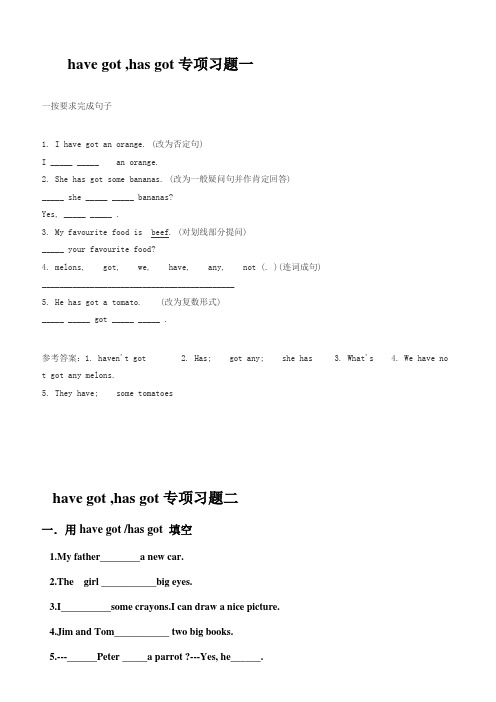
have got ,has got专项习题一一按要求完成句子1. I have got an orange. (改为否定句)I _____ _____ an orange.2. She has got some bananas. (改为一般疑问句并作肯定回答)_____ she _____ _____ bananas?Yes, _____ _____ .3. My favourite food is beef. (对划线部分提问)_____ your favourite food?4. melons, got, we, have, any, not (. )(连词成句)____________________________________________5. He has got a tomato. (改为复数形式)_____ _____ got _____ _____ .参考答案:1. haven't got 2. Has; got any; she has 3. What's 4. We have no t got any melons.5. They have; some tomatoeshave got ,has got专项习题二一.用have got /has got 填空1.My father________a new car.2.The girl ___________big eyes.3.I__________some crayons.I can draw a nice picture.4.Jim and Tom___________ two big books.5.---______Peter _____a parrot ?---Yes, he______.6.----Sandy, _____you _____any books? ----No, I_______.7.---How many rulers_____you_____?---I__________ten.8.Nancy and her mother____________long hair.They are beautiful.9.---______they_____cookies?--No, they_________.10.Pa ul________a lot of friends at school.二.句型题1.He has got lots of books.(写成缩写句子)| ____________________________________________________2.Lucy and Robert have got a car.(改为一般疑问句)____________________________________________________3.We have got big eyes .( 改为一般疑问句)____________________________________________________4.I have a pink dress.(改为一般疑问句)____________________________________________________5.Bill has a flower. (改为一般疑问句)___________________________________________________专项:句型转换1.句子是英语学习的核心,从句子使用的目的来分,可以分为四类:1.陈述句(肯定句和否定句),2.疑问句(一般疑问句,特殊疑问句和选择疑问句)3.祈使句(肯定句和否定句)4。
三年级外研版英语上学期看图写单词重点知识练习题
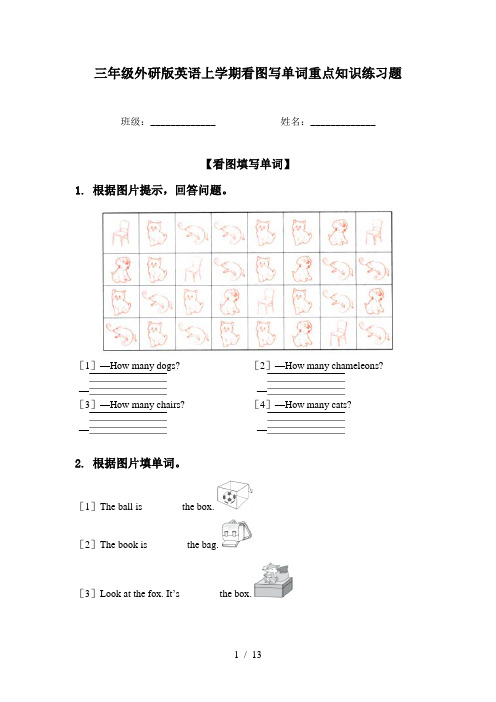
三年级外研版英语上学期看图写单词重点知识练习题班级:_____________ 姓名:_____________【看图填写单词】1. 根据图片提示,回答问题。
[1]—How many dogs? [2]—How many chameleons? ——[3]—How many chairs? [4]—How many cats?——2. 根据图片填单词。
[1]The ball is _______ the box.[2]The book is _______ the bag.[3]Look at the fox. It’s _______ the box.3. 看图,完成句子。
[1]It is a blue______.[2]It is a green _____.[3]It is a ____.[4]This is a ______.4. 小朋友快来写一写。
例:--- What are you going to do?--- I am going to do my homework.[1]---What are you going to do?[2]---What are you going to do?[3]---What are you going to do?[4]---What are you going to do?5. 看图片补全单词。
[1] gr__pes [2]d__sk[3] g__r__ffe [4] w__m__n[5] t__ __cher6. 看图,将单词填写完整。
[1]s________oon [2]p________ate[3]bow________ [4]sl________de [5]b________x [6]ch________ ________r [7]d________s______ [8]________r________nge 7. 根据句意,结合单词和右图提示,选择正确的词。
三年级下册英语一课一练-Unit 6 How many 课时(3) 人教PEP(word版,含答案)
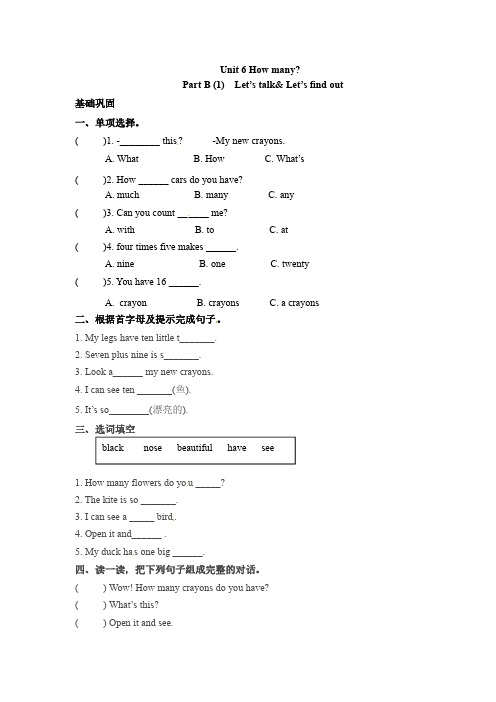
Unit6How many?Part B(1)Let’s talk&Let’s find out 基础巩固一、单项选择。
()1.-________this?-My new crayons.A.WhatB.HowC.What’s()2.How______cars do you have?A.muchB.manyC.any()3.Can you count______me?A.withB.toC.at()4.four times five makes______.A.nineB.oneC.twenty()5.You have16______.A.crayonB.crayonsC.a crayons二、根据首字母及提示完成句子。
1.My legs have ten little t_______.2.Seven plus nine is s_______.3.Look a______my new crayons.4.I can see ten_______(鱼).5.It’s so________(漂亮的).三、选词填空black nose beautiful have see1.How many flowers do yo u_____?2.The kite is so_______.3.I can see a_____bird.4.Open it and______.5.My duck ha s one big______.四、读一读,把下列句子组成完整的对话。
()Wow!How many crayons do you have?()What’s this?()Open it and see.()My new crayons.()1,2…16.You have16crayons.五、给下列问句选择合适的答语。
()1.Who’s that man? A.It’s on the desk. ()2.Where is my map? B.Yes,I do. ()3.What’s this? C.He’s my father. ()4.Do you like birds? D.Thirteen.()5.How many fish do you see? E.It’s a kite.能力提升六、按要求完成句子。
- 1、下载文档前请自行甄别文档内容的完整性,平台不提供额外的编辑、内容补充、找答案等附加服务。
- 2、"仅部分预览"的文档,不可在线预览部分如存在完整性等问题,可反馈申请退款(可完整预览的文档不适用该条件!)。
- 3、如文档侵犯您的权益,请联系客服反馈,我们会尽快为您处理(人工客服工作时间:9:00-18:30)。
6A Unit 1 小练习一、按所给词的适当形式填空1.Ben‟s cousin always _____________(have) many ____________(question) to ask him.2.“No _________(park)” means you shouldn‟t ________(park) your car here.3.________this sign _________(mean) “No smoking”? Yes, it does.4.I often _______ (take) a walk with _________(I) dog after supper.5.Those ________ (sign)_______(mean) different ___________(thing).6.Don‟t run or _______ (jump) in the classroom.8.When she _________(get) home, he ___________(quick) __________ (take) off her shoes.9.Mum, I want ______________ (watch) TV. No, you must _________ (go) to bed now.11. The book in the _____________(teach)hand is very ______________(interest).12. My sister is ____ (只有) five _____ (年) old.13. Would you like ______(some) apple ______(juice)?二、单项选择( ) 1. What does this sign ____? It ____ …No parking‟.A. mean, meanB. means, meanC. mean, means( ) 2. _______ it mean “ Danger!”? Yes, you‟re right.A. IsB. DoesC. Do( ) 3. What _______ these public signs mean?A. doesB. doC. are( ) 4. “Keep off the grass” means you _____ walk on the grass.A. s houldB. shouldn‟t.C. must( ) 5. Jack learns ________ from public signs.A. a lot ofB. a lotC. lot of( ) 6. There are __________public signs in this park.A. a lot ofB. a lotC. lot of( ) 7. I __________ carefully, but I can‟t find anything.A. looked atB. looked forC. looked around( ) 8. There‟s a book over there. Can you _____for me?A. pick it upB. pick them upC. pick up it( ) 9. The sign on the wall ________ “No smoking”.A. sayB. saysC. tells( ) 10. Please don‟t _________ in the library.A. smokeB. smokingC. smokes( )11. —Please don‟t take photos here. ——______.A. Not at all.B. OK. I‟m sorry.C. Thank you( )12. “_______”means we shouldn‟t make noise here.A. No smokingB. Be quietC. No parking( )13. Look at that sign ______ the monkey cage.A. inB. onC. at( )14. The students are __________ the magazines.A. readingB. seeingC. looking( )15. The park keeper points _____ a sign ______the grass.A. to/ inB. 不填/onC. to/ on三、改错(在题目中圈出错误之处,在横线上写出正确的答案)1. What does this sign mean s? It means …No smoking‟.______2. There are a lot of sign in the park. _______3. Can I go to there? Yes, you can. _____________4. ‟No photos‟ means we should take photos. _______5. My brother, Mike always have many questions. _______6. He taking photos in the park often. _______7. He must goes to school now. _______8. What do your brother usually do? He takes photos. _______9. There is no one near. _______10. The boy knows a lot of about weather. __________11. What is in breakfast? _________12. I‟m thirsty, I want drink some water. ______________13. Should he sits quietly?_______________14、There are some tea in the cup . __________四、完成句子1墙边有一只可爱的猫。
There _______ a _________ __________ __________the ___________.2它的意思是什么?它表示安静。
What ______it _________? It_________ …______ _______‟!3它们有不同的含义。
They mean ____________ _____________.4我可以进去吗?不,你不能。
______ I _______ ______? No, ______ _______. 5你必须远离那幢建筑物。
You must ___________ __________ ___________ the ____________.6在草地上有两张10元钱。
There_________ two _________ _________ _________ the _________.7我们不应该在这儿制造噪音。
We __________ ________ _________here.8.你应该学更多有关公共标志的知识。
You should _________ _________ about __________ _________.9.穿着红色毛衣的女孩是谁?__________ the girl _______ the red _________?10.看那个标志,你不应该在这儿吸烟。
Look at that _____ , you shouldn‟t here.10.公园里那幢大楼上的标志是“危险”The sign______the _______ ____the park ________”_________”.6A Unit 2 小练习一、用所给词的适当形式填空1. Nancy is ______(a) old student in _______(they) class2. Li Lei is one _______ (years) old now.3. Ann‟s birthday is on the _________( three) of May.4. Would you like ______ (go) shopping with us?5. It‟s time ______ (go) to bed now.6. Does Ben usually ______(have) a birthday party? Yes, he ________7. There are many ________(city) in China.8. They would like ________(have) supper.9. Can you _________(make) a model ship for ______(I). Yes, I ____________(make) a model ship now.10. Daming, ______ (come) to the blackboard at once.11. My classroom is on the ________(four) floor.12. David is a ________. He is ___________the Great Wall in China. (visit)13. Today is _________(child) Day. __________(student) are very_________(excite).14. He is ________(give) Ben some ________ (cartoon).15. It is the _______ (twelve) of October. 16. Listen, the children ________(sing) “Happy Birthday to you.”二、单项选择( ) 1. There are ___________months in a year.A. tenB. elevenC. twelve( ) 2. _________ is the seventh month of a year.A. JuneB. JulyC. November( ) 3. I‟m talking _____ my parents _____ my new scho ol.A. to, aboutB. about, aboutC. about, to( ) 4. Jack‟s birthday is _______the 15th of April.A. inB. at B. on( ) 5. My father‟s and mother‟s birthday are both______ December.A. inB. onC. at( ) 6. Would you like some flowers _____ a birthday present?A. forB. asC. to( ) 7. Would you like _________TV? Yes, I‟d like to.A. to watchB. watchingC. watch( ) 8. _______do you usually go to school? At seven ten.A. WhereB. WhenC. Whose( ) 9. The children are ________Ben‟s birthday party.A. onB. inC. at( ) 10. There are ____girl in Row(排)one. The _____one is my sister.A. three, threeB. three, third( ) 11. It‟s time ______some ca ke.A. toB. forC. as( )12. What date is it today? It‟s ___________.A. FridayB. the 3rd of MayC. eight o‟clock.( )13. There are _________days in October.A. twenty-nineB. thirtyC. thirty-one( )14. _______present is for Ben? The one on the desk.A. WhereB. WhoseC. Which( )15. December comes _________November.A. afterB. andC. before三、改错(在题目中圈出错误之处,在横线上写出正确的答案)1. My birthday is on the 18 of April. __________2. It is first lesson of this term. ___________3. Ben and his brother would like visiting their grandpa. _____________4. They are talk about their presents. _______________5. What would you like with a present?___________6. There are thirty-eighth students in the classroom. ______________7. I‟d like go home now. ___________8. We often go swimming on September. ____________9. It‟s time for watch TV. ___________10. Would you like any juice? Yes, please. ___________11. He wants to some flowers for his mother. _______12.Thursday is the fourth day of a week. __________四、完成句子1. 今天是几月几日?6月14日。
